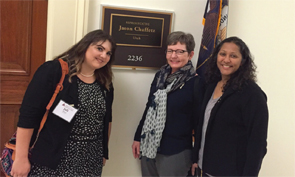
Legislators take their constituents seriously, which is why it’s important for physicians, patients and rheumatology health professionals to take an active role in advocating for issues important to rheumatology. Shown here (from left), Juli Jensen (patient), Monica Snowden, MD, and Elizabeth Etherton, CNP, take rheumatology to the Hill. Courtesy Elizabeth Etherton
Over the past several years, the ACR has ramped up its efforts in advocacy. Under the leadership of the Government Affairs Committee, many ACR staff, members and their patients, considerable progress has been made moving priority issues forward in 2015.
A few highlights from 2015 include:
- The Patients’ Access to Treatment Act (PATA) was introduced into Congress. This legislation would make specialty therapies, including biologics, more affordable for patients by limiting cost-sharing requirements.
- The ACR successfully advocated with the Food and Drug Administration (FDA) for biosimilar products to have distinguishable names. Additionally, biosimilar notification legislation was passed by more than 10 states. These important regulatory and legislative actions will help ensure the health and safety of patients who are prescribed biologics or biosimilar therapies.
- Funding was reinstated to the arthritis program at the Centers for Disease Control and Prevention (CDC). This funding allows the CDC to continue operating a range of arthritis research, awareness and intervention programs.
- The ACR played a leading role in the introduction of an ICD-10 safe harbor implementation period. The CMS announced that claims will not be rejected during the next year because of selecting the wrong ICD‑10 subcode—a small victory for doctors.
- The ACR was able to bring 35 patient advocates to Washington, D.C., in 2015 for more than 300 meetings with lawmakers. There is no substitute for lawmakers hearing from constituents on how policies affect them directly.
- Patient advocates used Simple Tasks’ new Legislative Action Center to send more than 320 emails to members of Congress about issues affecting rheumatic disease patients.
With an ongoing effort from ACR members and patients, we can continue to advance legislation that supports rheumatology in both the House and the Senate, and have it signed into law. To continue to be successful in advancing legislation, the ACR relies on dedicated grassroots advocates who are willing to go the extra mile to push their elected officials. Advocacy methods include emails, in-district visits and calls.
Get Your Patients Involved
It’s crucial to remember that all legislators—on the federal, state and local levels—are politicians whose continued success depends on their ability to satisfy voting constituents. Re-election, recognition and status are powerful motivators. Effective grassroots advocacy can wield as much influence on these outcomes as the biggest corporation or trade association.
[To advance legislation], the ACR relies on dedicated grassroots advocates who are willing to go the extra mile to push their elected officials.
There is no substitute for lawmakers hearing from constituents on how policies affect them directly. Because of this, grassroots advocates are at the heart of our strategy. In order for us to effect meaningful change, we all must get involved and do something to benefit the future of our patients and our profession. Continued success depends on the involvement of ACR members and patients across the country.
The patient voice helps ensure a winning strategy is delivered and impactful policy change is adopted. Patient advocates are instrumental in creating more awareness about rheumatic diseases among our members of Congress, as well as advancing legislation that protects patients’ rights to receive timely, appropriate, safe and affordable healthcare.
Patients are constituents, too, and have personal stories that illustrate the issues faced every day in the rheumatology community. Their perspectives often include firsthand experience with the challenges of accessing rheumatologic care or treatments. Our patients can also highlight the need for more research funding to advance breakthroughs in patient care. The patient effort is necessary to gain national awareness on public health issues that affect patients with rheumatic diseases.
How Can You Involve Your Patients in the ACR’s Advocacy Efforts?
- Encourage patients to apply to attend the ACR’s annual Advocates for Arthritis conference in Washington, D.C. Registration opens this summer: Advocates for Arthritis engages ACR members and patient advocates in political advocacy and increases awareness of rheumatology issues on Capitol Hill. Participants meet with members of Congress and their staff to discuss current legislative issues that affect the rheumatology community as a whole. This is an opportunity for members and patients to establish valuable relationships with both legislators and their staff.
- Encourage patients to contact Congress by visiting Simple Tasks’ Legislative Action Center. Elected officials rely on constituent input to be effective legislators, and ongoing communication is the only way they will know how their constituents feel about particular issues. Encourage your patients to call, write or meet with their members of Congress to educate them about the diseases and conditions affecting the patients’ quality of life. Patients can visit the ACR’s legislative action center to find contact information for members of Congress.
- Encourage patients to share their story through the ACR’s Simple Tasks campaign. If your patient has a testimonial of how access to services or treatment has adversely affected their life, encourage them to contact [email protected] to share their story.
Getting involved in advocacy is a great way to influence the legislative process. Without the patient voice, delivering meaningful results would be difficult, if not impossible. Remind your patients that their voice is needed and their actions will make a difference to rheumatology.
 Joan M. Von Feldt, MD, MSEd, FACR, FACP, is the president of the ACR, professor of medicine at the Perelman School of Medicine at the University of Pennsylvania. She is also staff physician at the Philadelphia VA Medical Center.
Joan M. Von Feldt, MD, MSEd, FACR, FACP, is the president of the ACR, professor of medicine at the Perelman School of Medicine at the University of Pennsylvania. She is also staff physician at the Philadelphia VA Medical Center.

